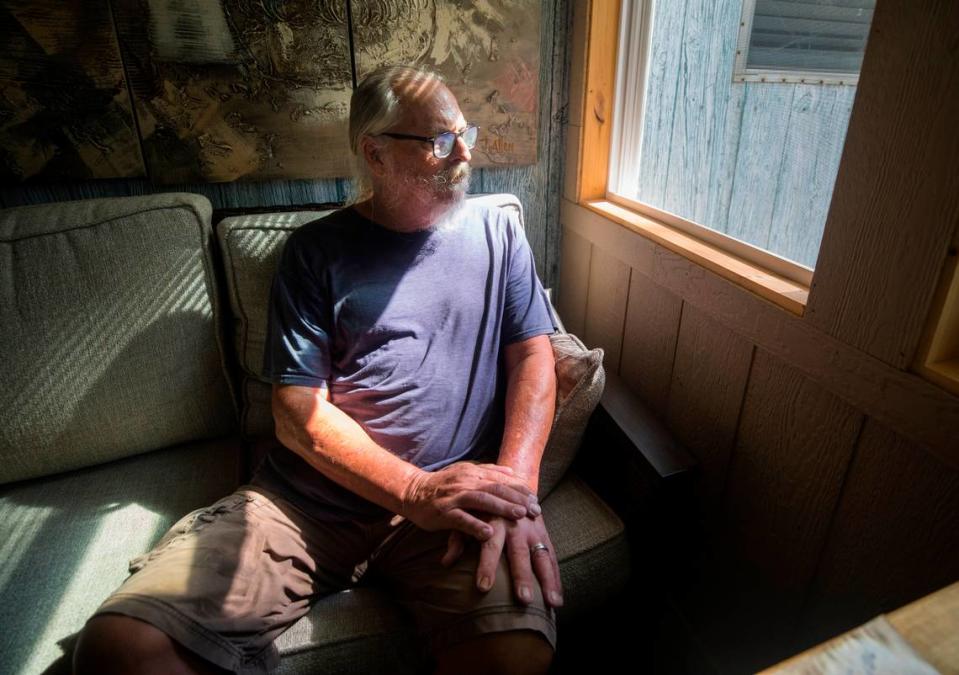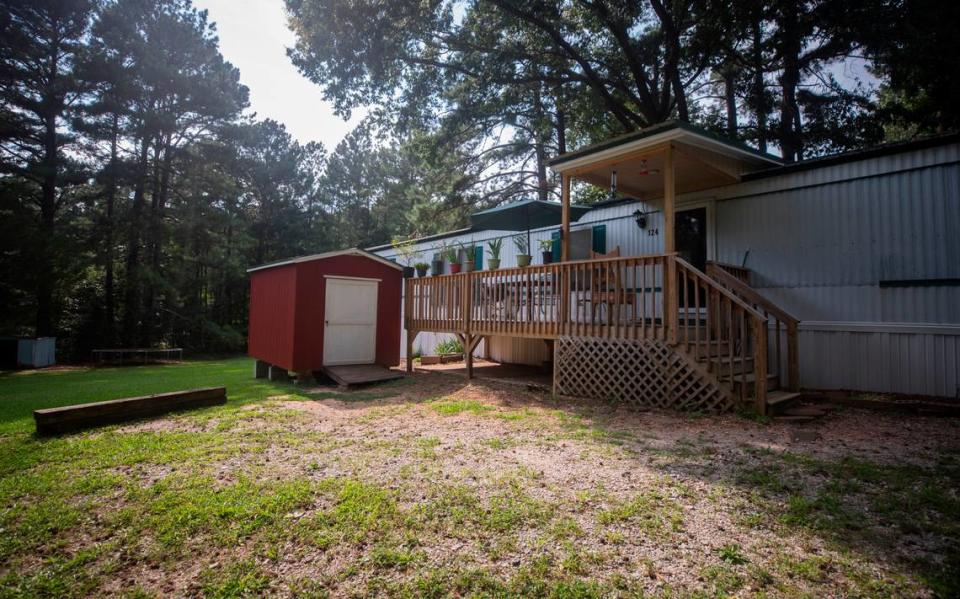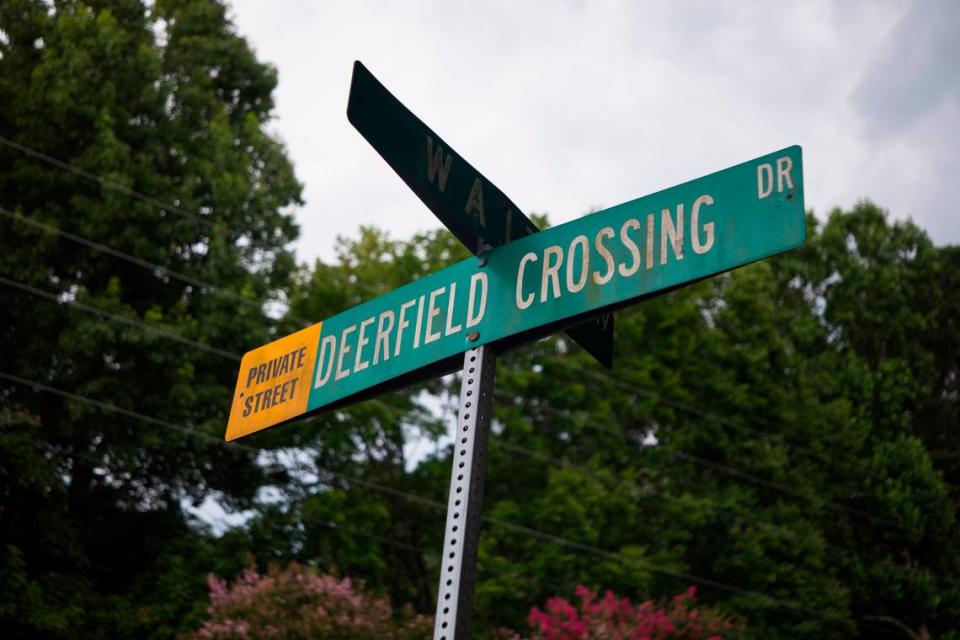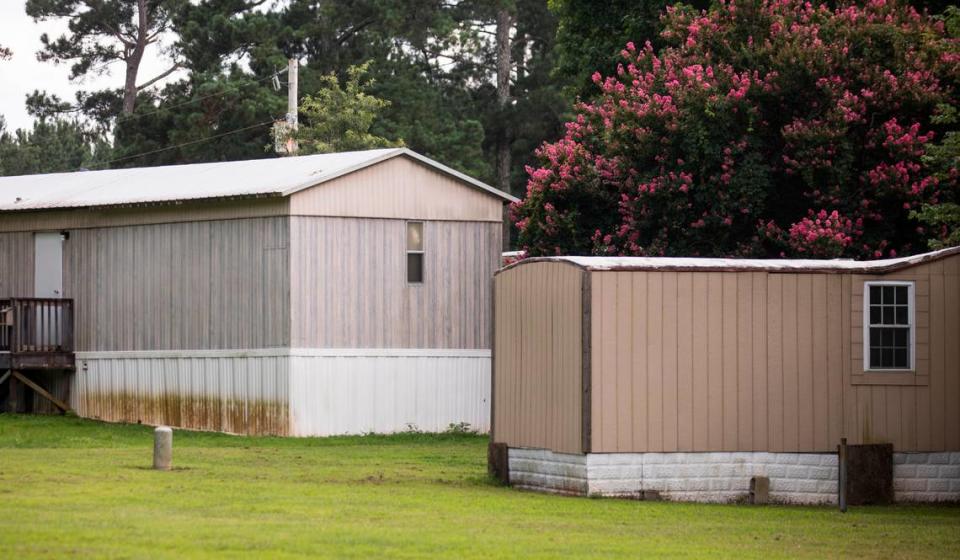‘I don’t want to move. I want to stay.’ Wake Co. residents fight for mobile home park.
Bill Moran posted a for-sale sign on the busy highway in front of Wellington Park after learning 260 homes and townhouses could replace his mobile home and 46 others in the Wake Forest mobile home park.
It might be time to pull up the sign, he said Friday.
“The thing is, I don’t want to move. I want to stay,” Moran said, as he proudly showed off his “man cave” — an enclosed porch he built off the back of the home with views of the park’s tree-covered landscape.
Next door, black plastic and bare earth were all that remained of his neighbors’ home. They moved out a few days ago, he said.
Those who remain want the park’s owner, former Wake Forest Mayor George Mackie Jr., to sell the 36-acre park to them instead of developer Middleburg Communities. They’ve asked the Wake Forest Board of Commissioners to deny the project’s rezoning.
On Saturday, they had a news conference planned to bring more attention to what’s happening and to pressure Mackie to reconsider.
“He was trying to give people hope again while (he was) mayor. The way things are today, I believe we can forget all that,” said Moran, a U.S. Air Force and Vietnam War veteran, who fought back tears Friday while reading from a prepared statement. “I believe the developers, Middleburg Communities, need to quit making people out here homeless, scared and desperate.”

Affordable housing, mobile home parks lost
Wellington Park — also known as Deerfield Crossing — is the latest Triangle mobile home park to be threatened by development pressures and the loss of mom-and-pop owners who have kept the rent low for decades for those who can’t afford another option.
Most of the Wellington Park neighbors own their homes and rent the land underneath for $300 a month — compared to lot rents of $500 or more at many other Triangle-area mobile home parks.
More investors also have turned to mobile home parks since the 2008 recession as a stable investment or for cheap land to redevelop.
North Carolina had 4.7 million housing units in 2019, roughly 12.2% of them mobile homes, according to the U.S. Census. About two-thirds of the mobile homes were owner-occupied, according a 2018 UNC School of Government report, serving mostly working-class, elderly and a growing number of immigrant families.
In Wake County, there were fewer than 11,800 mobile homes, Census data showed.
Roughly a third of those mobile homes are over 40 years old, built before the federal government regulated their construction, a separate UNC report shows. Many cannot be easily moved to another park or private land, and the cost of moving a mobile home, getting permits and reconnecting to utilities at a new lot can range from several thousand dollars to over $20,000.
Finding a vacant lot in a mobile home park or private land where a mobile home can be installed also can be a challenge.

Facing homelessness
Wellington Park resident Harold Burnett said he, like other neighbors, will be homeless if the park closes, because he can’t afford to move with the fixed Social Security income he gets each month.
Burnett heard about the owner’s plans just a week after learning he had cancer, a lingering effect from his exposure to Agent Orange in Vietnam, the U.S. Army veteran said. His seven-year home at the park is near his brother and has room to store his bass boat when he’s not fishing on Falls Lake, he said.
“I’m going to tell you, the fear of being homeless was worse than the cancer diagnosis,” Burnett said.
Many of the park’s residents are in similar situations, said Katia Roebuck, an organizer with ONE Wake. The developer has offered to pay $250,000 — a little over $5,000 for each family — to help with relocation costs, she said, but it’s not enough.
“There’s nothing affordable in Wake Forest anymore, but even if they have a place to go, some of (the homes) are so old, they wouldn’t make it,” she said. “What are they going to do?”
Government decisions, resources
The Triangle’s rapidly growing population adds to the pressure, with more expensive apartment complexes and subdivisions lining the area around Wellington Park. Mackie has been working to develop his family’s land there since 2014, according to The Wake Forest Gazette. The original Quail Crossing proposal was for 307 homes and townhomes covering 116 acres, including the park.
More recent plans omitted the park, and in September, Radford Glen was approved. It will add 165 single-family homes next door.
Middleburg Communities is expected to bring its plans for Wellington Park to the town commissioners in September, Wake Forest Mayor Vivian Jones said Tuesday. The land is outside the town but in its planning jurisdiction, and could be annexed if redeveloped.
Jones said she didn’t know enough about the Wellington Park situation to comment.
The News & Observer’s efforts to reach Mackie by phone were unsuccessful.

Wake Forest Commissioner Bridget Wall-Lennon acknowledged that the decision between letting residents keep their affordable homes and letting the landowner develop his property, which is his right, is a tough one.
The task is harder because local governments have few resources to help, and because Mackie could evict the residents even if the project is denied, Wall-Lennon said. He would have to give the residents 180 days notice before evicting them under state law.
Wake County’s housing department and its community partners are looking into what they can do to help, she said. The town, which is grappling with the same affordable housing issues as other governments in the region, is drafting an affordable housing plan.
“This right here, first and foremost, it’s almost like a crisis situation, because while development can cause growing pains, for individuals to have to be relocated is much different than somebody doing some development next door to you and you’re worried about the impact of that versus you directly being impacted and (losing) your home,” Wall-Lennon said.
Chapel Hill’s Town Council faced a similarly tough decision in March when a developer warned the council that residents of a mobile home park at 1200 Martin Luther King Jr. Blvd. might be evicted if a rezoning allowing the owner to replace a gas station on the land and add a self-storage building was not approved. The approved rezoning only preserves the mobile homes for 15 years.

Grassroots, cooperative ownership
Wellington Park residents have reached out to ROC-USA for help. They also are working with local churches, ONE Wake — a multi-racial coalition of over 50 groups — and the N.C. Congress of Latino Organizations.
ROC-USA helps mobile home park residents form nonprofit cooperatives to buy and manage their parks. Resident members continue to own their homes, as well as an interest in the land, providing them with stable rent rates and eviction protection for many years.
The model has seen success in other parts of the country, but is only getting started in North Carolina, where ROC-USA worked with Carolina Common Enterprises in November to save the 60-home Oak Meadows community in Asheboro.
There have been other negotiations but no deals yet, including at the Ridgewood Road Mobile Home Park in Orange County, where Ridgewood Road MHP LLC, a subsidiary of hedge fund Alden Global Capital, outbid the residents and bought the park in April.
Thomas Beckett, executive director of Carolina Common Enterprise, said that buyer paid “well above market rate.” He declined to talk about conversations with the Wellington Park residents or about their situation.
Wellington Park resident Maria Magana said she would like the opportunity to buy her neighborhood.
Like others, she has overcome many challenges, immigrating from Mexico and becoming a U.S. citizen four years ago. In 2014, she moved to a singlewide home in Wellington Park, where she built a house-cleaning business and a life for her sons. Last year, they spent $26,000 to buy a doublewide home and sold their older mobile home to a friend.
Her two grown sons work in carpentry and construction, the 55-year-old resident said, but she would lose all of her business clients if they are forced to move. Her youngest son, who is in middle school, would have to leave his friends behind.
It wouldn’t be the first time they’ve been forced to move, she said in Spanish, as Roebuck interpreted.
“They were living in another neighborhood, and they sold it and they built something. (Magana’s family) moved here, and now this is happening again,” Roebuck said. “The commissioners are saying they do care and they’re concerned about having affordable houses, but this is the last piece of land.”

